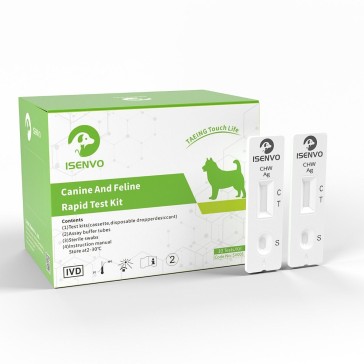What Dog Owners Should Know About Common Intestinal Infections and At-Home Testing
Dogs are susceptible to a range of intestinal infections that can cause serious illness if left untreated. Among the most concerning are Canine Parvovirus (CPV), Canine Coronavirus (CCV), and Giardia lamblia, a microscopic parasite. These infections are highly contagious and can spread quickly, especially among puppies and shelter dogs.
This guide provides a clear overview of what each of these pathogens is, how they spread, the warning signs to watch for, and how dog owners can detect them early using a convenient home testing method.
What Are CPV, CCV, and Giardia?
Canine Parvovirus (CPV)
CPV is a highly contagious and potentially deadly virus, especially in puppies. It attacks rapidly dividing cells, primarily in the gastrointestinal tract.
Symptoms may include:
Severe vomiting and bloody diarrhea
Loss of appetite
Lethargy
Dehydration
Fever
CPV spreads through fecal-oral contact and can survive in the environment for months.
Canine Coronavirus (CCV)
CCV also affects the digestive tract but tends to cause milder symptoms than CPV. However, co-infection with CPV can lead to more severe illness.
Symptoms may include:
Diarrhea
Vomiting
Mild fever
Reduced appetite
CCV spreads through contact with infected feces and contaminated surfaces.
Giardia Lamblia
Giardia is a microscopic intestinal parasite that causes giardiasis, a common illness in both dogs and humans. It spreads through contaminated water, soil, food, or surfaces.
Symptoms may include:
Intermittent or chronic diarrhea
Weight loss
Fatigue
Abdominal discomfort
Dogs can carry Giardia without showing symptoms, making early detection crucial.
How Are These Infections Transmitted?
All three pathogens are spread primarily through contact with contaminated feces—whether through direct contact, shared surfaces (like kennels, grooming tables), or contaminated water.
High-Risk Scenarios:
Dog parks, shelters, and boarding facilities
Puppies (especially unvaccinated)
Dogs with compromised immune systems
Drinking from puddles or untreated water sources
When to Test Your Dog
If your dog shows symptoms such as diarrhea, vomiting, lethargy, or loss of appetite—especially after being in contact with other dogs—testing for CPV, CCV, and Giardia is a logical first step.
Early detection not only helps with treatment but also prevents these illnesses from spreading to other dogs in the household or community.
At-Home Testing: A Practical Option
The ISENVO 10Pcs Canine CPV+CCV+GIA Ag Combo Rapid Test Kit offers a simple, accurate way to detect parvovirus, coronavirus, and Giardia antigens in dog feces—all from the comfort of home.
Product Overview
Type: Chromatographic immunoassay
Purpose: Detects CPV, CCV, and Giardia antigens
Sample required: Feces
Results time: 5–10 minutes
Ease of use: No additional equipment required
What’s Included
Each kit contains:
Test cassette
Sterile disposable dropper
Buffer solution
Swab stick
User instructions manual
The test is shelf-stable for at least 12 months and undergoes triple quality control for reliability and consistency.
How the Test Works
Collect a small stool sample using the swab.
Mix the sample with the buffer solution provided.
Apply a few drops to the test cassette.
Wait 5–10 minutes for results.
A visible line will indicate whether any of the three pathogens are present. For any positive result, follow up with your veterinarian for confirmation and treatment options.
What to Do if the Result is Positive
A positive result doesn’t necessarily mean your dog is seriously ill, but it should be taken seriously. Follow up with a veterinarian for:
Confirmatory diagnostic tests
Supportive care such as fluids, medications, and isolation protocols
Guidance on how to disinfect your home environment
Prompt intervention can dramatically improve outcomes, especially in young or vulnerable dogs.
Preventing Intestinal Infections
Key Prevention Strategies
Vaccinate your dog, especially against CPV and CCV
Practice good hygiene—clean food bowls, kennels, and hands regularly
Avoid communal water sources when walking outdoors
Quarantine new dogs or rescues until tested
Routine testing is especially important in high-risk environments or if you work with rescue dogs, breeders, or shelters.
Final Thoughts
Canine intestinal infections like CPV, CCV, and Giardia are common but manageable with early detection and appropriate care. Using a reliable at-home tool like the ISENVO Canine CPV+CCV+GIA Ag Combo Rapid Test Kit allows dog owners to monitor their pet’s health quickly and affordably.
If your dog is showing symptoms—or if you simply want peace of mind—testing at home is a smart step toward protecting both your pet and the dogs they encounter.












Validate your login